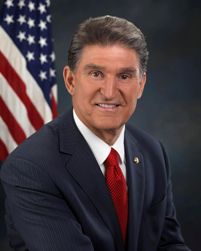Will Joe Manchin Run for Governor Again?
Only two ex-governors have attempted a comeback in state history

The reports circulated following Republican Attorney General Patrick Morrissey’s recent 5.7-point primary victory with just one-third of the vote in a competitive six-candidate field.
Manchin, who served as West Virginia’s chief executive from 2005 to 2010, would not be able to secure the Democratic nomination without Huntington Mayor Steve Williams first dropping out of the race.
Williams ran unopposed in the Democratic primary – the first nominee for the party to do so across the 29 primaries conducted for the office since 1916. [Republicans held their first gubernatorial primary in 1912].
In fact, Democratic primary voters have had the choice of more than two candidates in all but five other cycles with the exception of 1920, 1980, 2000, 2008, and 2012.
Manchin would also become just the third former West Virginia governor – and first Democrat – to attempt a comeback for his old job.
Republican Cecil Underwood was the first – but it took him three attempts to return to the governorship.
Underwood served from 1957 to 1961 but was term-limited from running for reelection in 1960.
In 1964, however, he easily won the GOP nomination with an 83.0-point victory over Elkins furniture store owner (and former Democrat) Harry Cupp in a three-candidate field.
But Underwood lost the general election to former state Commerce Commissioner Hulett Smith by 9.8 points in the face of a national Democratic wave.
Four years later, Underwood was defeated in the Republican primary by Arch Moore; the two men would account for 10 of the 12 GOP nominations for the office from 1956 through 20000.
In 1976, Underwood tried again, this time winning a six-candidate primary field with nearly two-thirds of the vote before getting trounced by 33.8 points that November by Jay Rockefeller.
Twenty years later, Underwood made a fourth attempt and edged ex-NASA and U.S. Navy pilot Jon McBride by 7.8 points in the GOP primary.
Underwood defeated former state Senator Charlotte Pritt by 5.8 points in the general election and would serve four more years before losing his 2000 reelection bid to U.S. Representative Bob Wise.
Like Underwood, Republican Arch Moore also received his party’s nomination five times.
Moore served eight years (1969-1977) by defeating attorney James Sprouse (1968) and Jay Rockefeller (1972) but was term-limited in the 1976 cycle.
In 1980, Moore launched his first comeback attempt and won the GOP nomination without opposition before losing a rematch by 8.7 points against then Governor Rockefeller.
Moore attempted a second comeback in 1984 and was again unchallenged in the Republican primary en route to winning the open seat race against House of Delegates Speaker Clyde See by 6.4 points.
Moore was renominated again in 1988 but lost his bid for a fourth nonconsecutive term to insurance executive Gaston Caperton.
Follow Smart Politics on X/Twitter.

Underwood also ran in 1968, coming in second to Moore in the GOP gubernatorial primary.
Thanks for catching that Daniel – a short paragraph adding that in for context is now included above.
Breaking news: Joe Manchin won’t run for governor.
IMO, it made no intuitive sense for Senator Manchin to seek a return to Wheeling, having left it in 2010 for an apparently more prestigious gig a bit to its east. As well, he evidently lacked a sufficient degree of political support to succeed as a non-major party contender (e.g. Lieberman in 2006, Murkowski in 2010) anyway.
Were it not for an inexplicable pardon by President Ford (he ought to have waited until conviction, or at least indictment), ‘POTUS 37’ likely would have become the first onetime occupant thereof to have been convicted of a felony (even if later reversed on appeal) – making Thursday 30 of 05 2024 a comparatively less historic date in US political history.
(On 31 May ’24 Manchin announced his change of affiliation from Democratic to independent.)
Since the ‘direct election era’ started, the senate has had independent members (including those belonging to a minor party, e.g. James Buckley during the 1970s; with nearly all aligning with a D or R caucus) from time to time, indeed continuously since 2001. Has the chamber had *four* (or more) such occupants at any prior period?
Four is definitely a first for true independents. Although four non-major party U.S. Senators did serve together from 1937 to 1940: Minnesota Farmer-Laborites Henrik Shipstead and Ernest Lundeen, Wisconsin Progressive Robert La Follette Jr., and Nebraska independent George Norris.
We haven’t seen someone try to go GOV – SEN – GOV in a while; not since Henry Bellmon (R-Okla.) in 1986, to be exact. [It is rather curious timing for the switch in party affiliation. It gives Manchin an extra two months to decide on a 2024 campaign, either for re-election or for governor, though of course in his public statements he still has no intention of pursuing either.]
A Manchin-Morrisey matchup for governor would also be a rematch of their 2018 Senate race, where Manchin held onto his seat by 3 points. I wonder if there has ever been a gubernatorial election that was a rematch of a previous Senate election. I can think of one example that was the other way around: Linda Lingle (R-Hi.) defeated Mazie Hirono (D-Hi.) for governor in 2002, and they faced off again for Senate in 2012, with Hirono winning easily as was expected for a federal election. Also, Joseph E. Brennan (D-Maine) and Susan Collins (D-Maine) both competed for governor in 1994 and Senate in 1996, though the 1994 election was a three-way won by independent Angus King.
“…Susan Collins (D)…” Some on the far right – even within ME – would argue that the Senate ‘lifer’ is in fact a (functional) *Democrat*!
As for 1994, former Governor Brennan in fact finished *ahead of* Collins – thus making *that year* one of those occasions where the party of the president (symbolically) prevailed in a gubernatorial election in that often contrarian/”naysayer” state.